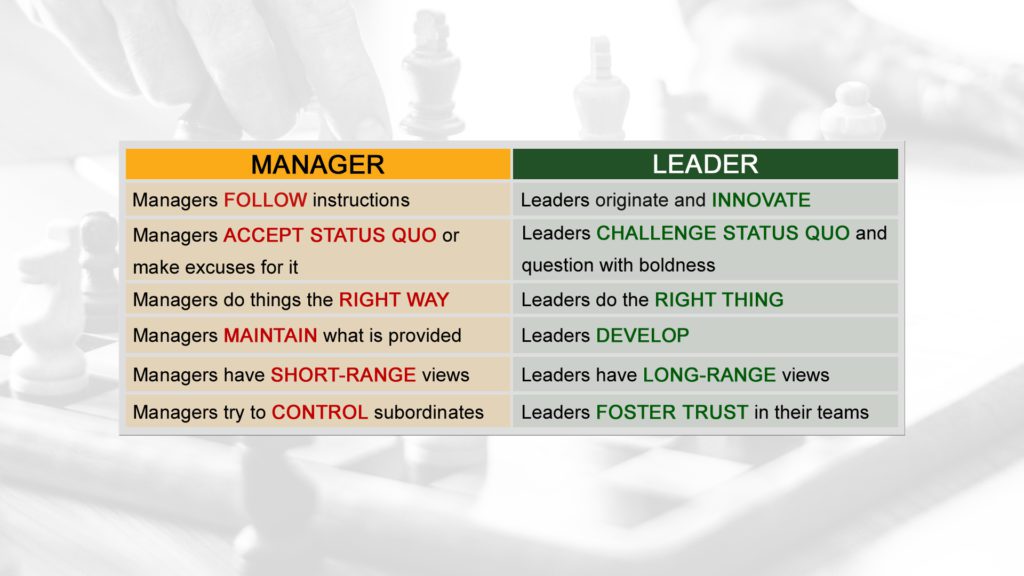A Manager Versus a Leader
Manager versus Leader. Many assume they are the same. Is there a difference between the two?
A challenging task for most would be attempting to define or delineate the difference between a Manager and a Leader. I must admit that at one time, I, too, found myself perplexed at the notion that there was a difference. I often associated one with the other, or better said, believed that one WAS the other.
Today, of course, I know this is not the case. Due to extensive research on the topic, both in and outside of academia, I have a much firmer grasp of the difference. However, I must admit that in all of my research, I am most impressed with one man’s basic descriptions of the two. That man is Warren Bennis.
Warren Bennis wrote a book called “On Becoming a Leader.” For lack of better words, Bennis presented his case very bluntly, which I was grateful for. His attempt to avoid bias was recognized and appreciated. His use of historical context was needed, and his conversational writing made it an easy and enjoyable read.
Many of his points were highly accurate, and I must admit that his logic helped me better define the differences myself. In his book, Bennis provided a substantial list of differences that helped paint the picture and help me visualize the differences being talked about.
A brief example and some of my favorites include the manager administers; the leader innovates. The manager maintains; the leader develops. The manager relies on control; the leader inspires trust. The manager has a short-range view; the leader has a long-range perspective. The manager imitates; the leader originates. The manager accepts the status quo; the leader challenges it. The manager does things right; the leader does the right thing. (Bennis, 2009) In all, I would have to concur.

Knowing the differences between a manager and a leader is step one. We must then ask ourselves, “what makes a good manager”? I believe a good manager would have to be someone who can follow instructions well and ensure the instructions are followed through while maintaining the vision provided to them by their leadership.
So then, what would make a good leader? Well, a good leader would be brave. A good leader would have the audacity to “Question with boldness even the existence of a god…” (Jefferson 1787) and create a vision, innovate change, inspire and provide direction as the opportunities presented themselves.
A true leader and a true manager play two very separate roles. A great example of a true manager is a former colleague. He was, by all definitions, a great manager. He listened well, and he achieved the tasks provided to him promptly. He often followed instructions to the letter and attempted to overachieve within the instructions provided. He relayed answers provided to him for problems as they arose. However, he feared (often vocally) finding unauthorized solutions to immediate or complex issues. He was also very reluctant to accept direction or advice from anyone other than his direct supervisor, for he often said: “what if the boss doesn’t like that?” Due to this, he was rarely relied upon by colleagues and was rarely turned to (by anyone) for innovative ideas. Because of this, he had been in the same position for over 15 years and had watched others promote over him many times, often to his great disappointment and inner turmoil.
In retrospect, I think it’s funny that I found managers and leaders to be one and the same at one point. Today, I see more of a difference between managers and leaders than I do between night and day. So ponder whether you follow instructions as provided or one that creates the path to follow. Do you do things right, or do you do the right things? Of course, these are not just questions regarding the business. These concepts often play out in all aspects of our lives. Many of us are managers; few of us are leaders.

Resources for Manager Versus Leader:
- Bennis, W. (2009). On becoming a leader. (4th ed.). Philidelphia: Perseus Books Group.
- Thomas Jefferson to Peter Carr, 10 August 1787; Boyd, Julian P., Charles T. Cullen, John Catanzariti, Barbara B. Oberg, et al., eds. The Papers of Thomas Jefferson. Princeton: Princeton University Press, 1950-. 33 vols.




